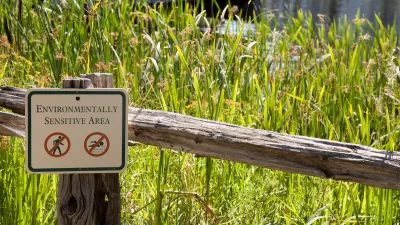You may have heard of 'peak oil,' but what about 'peak water' or 'peak wood'? Terry Tamminen looks at the range of natural resources we're using up "far too quickly."
Although there's debate about whether we've in fact reached 'peak oil' levels, the term itself refers to the demand for the natural resource eventually outstripping the available supply. According to Tamminen, scientists and policy makers have identified a number of other precious natural resources that may soon be in short supply. Peak wood, peak water, and even peak fish, are driving global leaders and corporations to rethink their sourcing, extraction, and production strategies.
"These peak trends have motivated retailers like Walmart, Tesco, and Target to set standards for suppliers around sustainable sourcing, because executives I have spoken with are concerned their shelves will one day be empty or prices will exceed their customers’ budgets, which in turn impacts corporate bottom lines," says Tamminen.
"Make no mistake, peak anything is a warning signal that smart consumers will increasingly use to make more sustainable choices and to plan for a resource-constrained future. And that should peak the interest of any business person or politician."
FULL STORY: Forget Peak Oil, We’re At Peak Everything

Maui's Vacation Rental Debate Turns Ugly
Verbal attacks, misinformation campaigns and fistfights plague a high-stakes debate to convert thousands of vacation rentals into long-term housing.

Planetizen Federal Action Tracker
A weekly monitor of how Trump’s orders and actions are impacting planners and planning in America.

In Urban Planning, AI Prompting Could be the New Design Thinking
Creativity has long been key to great urban design. What if we see AI as our new creative partner?

King County Supportive Housing Program Offers Hope for Unhoused Residents
The county is taking a ‘Housing First’ approach that prioritizes getting people into housing, then offering wraparound supportive services.

Researchers Use AI to Get Clearer Picture of US Housing
Analysts are using artificial intelligence to supercharge their research by allowing them to comb through data faster. Though these AI tools can be error prone, they save time and housing researchers are optimistic about the future.

Making Shared Micromobility More Inclusive
Cities and shared mobility system operators can do more to include people with disabilities in planning and operations, per a new report.
Urban Design for Planners 1: Software Tools
This six-course series explores essential urban design concepts using open source software and equips planners with the tools they need to participate fully in the urban design process.
Planning for Universal Design
Learn the tools for implementing Universal Design in planning regulations.
planning NEXT
Appalachian Highlands Housing Partners
Mpact (founded as Rail~Volution)
City of Camden Redevelopment Agency
City of Astoria
City of Portland
City of Laramie





























